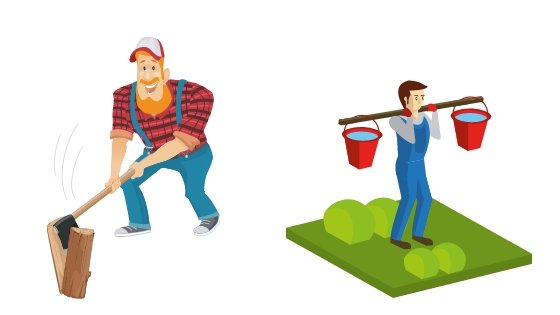Chop Wood Carry Water Summary by Joshua Medcalf teaches you why achieving mastery isn’t a piece of cake and often requires hard work with patience. It also teaches how building routines can help you progress.
Who Should Read “Chop Wood Carry Water Summary”?
- Anyone who is working on his craft and wants to achieve mastery.
- A professional who is stuck and isn’t progressing.
- Anyone who is confused about whether he should give his hundred percent or do smart work.
- All those who struggle in establishing a tedious routine.
Get the book on Amazon: Paperback | Audiobook
Why You Should Read “Chop Wood Carry Water Summary”?
This book’s theme is why one should stay on the path of hard work with patience and perseverance.
Especially if you discuss the professional world, you’re expected to possess skills that are hard to acquire.
And to achieve mastery of those skills, you must know what it takes to build them.
It’s much harder to focus and do tedious daily tasks with patience in today’s world.
Most people lose focus and get discouraged.
This book will also help you realize the power of discipline and the monotonous tasks you do every day.
Best Tools for Bibliophiles
- Listen to your Favorite Books on The Go: Try Audible and Get Up To 2 Free Audiobooks | Get 3 Free Audiobooks
- Read over 2 million e-books on any device: Sign up for 30 days free trial of Kindle Unlimited and read your favorite titles.
- Get free 2-day shipping of your favorite books and stream premium TV shows on Amazon Prime: Sign up for 30 days free trial of Amazon Prime.
- I use Notion to take reading notes, plan everything, and run all my businesses. (Notion is my Second Brain 🤯): Get Notion for free for personal use (paid for teams/businesses)
Chop Wood Carry Water Summary [PDF]
In this summary, I’ll share all the lessons I’ve learned from the book.
Let’s get started.
What Does “Chop Wood Carry Water” Mean?

In this book’s context, it is a tradition that Japanese samurai warriors practice deliberately to maintain discipline and consistency.
In simple words:
If you practice a straightforward thing (like chopping wood and then carrying water) every single day of your life, you’ll become great one day.
This simple practice would teach you the value of consistency, which is needed to become great in your craft.
For example, John wanted to become a samurai archer. Instead of practicing archery all day, he was asked to chop wood and carry water every day by his trainer Akira.
Akira did this to inculcate the discipline and consistency within John’s mind and soul.
And since this book is all about working religiously despite all the odds, Joshua has named it so.
Okay, let me ask you one thing:
Does chopping wood and carrying water sound exciting to you?
To most people, it’d be nothing less than a mere waste of time.
It’s fucking monotonous and not sexy at all. (Sorry for the harsh words.)
And that’s why it’s so effective and valuable.
The use of this technique isn’t fancy and thus keeps you on the ground.
And what if someone fails to do this if he wants to become a samurai?
Definitely, he won’t be able to become one. At least, it’d take him more than thirty years.
Don’t believe me?
Well, I’m not claiming this. This was said by Akira, the mentor of John, who fantasized about being a samurai archer all his life.
And yeah, I forgot to mention that John practiced hard to achieve his goal. Yet, he wasn’t allowed to skip this tradition.
This technique of chopping wood and carrying water prepares a person to develop the necessary foundation required to sustain the weight of success.
Lesson #1: Fall In Love With The Journey

Imagine you are trying to learn digital marketing.
You spend hours doing social media promotion, creating products, and running paid campaigns, but still, you don’t get the followers you expected.
Now you become depressed and feel like giving up.
Somehow, you bounce back; you become optimistic by watching motivational videos and get back to work in the hope of seeing some great results.
But unfortunately, you fail again because of fierce competition in your niche or market.
After that, you fall further into depression.
Above is just an example of how things might take a wrong turn and push you toward terrible circumstances.
A similar thing happened with John. He was practicing day and night, yet he wasn’t performing as well as he wished to do.
Plus, Akira told him that it takes around ten years to master and become a samurai archer.
So what’s the point here?
The point is:
In both the cases above, the person isn’t in love with the process. He expects rewards, but doesn’t want to overcome the obstacles present in his path.
The path to greatness isn’t easy.
But people today want everything instantly. They don’t want to hustle. They want it sweet and easy.
Therefore, commit yourself, and no matter how arduous the journey or the process is — keep moving.
Special Deal: Try Amazon’s Audible for 30-days & Get 2 Free Audiobooks
Lesson #2: Build Your Life Like You Would Build Your Last House

Imagine you are about to retire, and you’ve to build a house that would allow you to live happily ever after.
What would it look like? How much money would you spend on it?
If I predict, you’ll spend a hell lot of time first thinking about its blueprint and then making a hefty investment in it.
You’d meticulously plan everything.
Would you hire unprofessional builders? Of course not.
You’d put your heart and soul into finding the perfect location for it.
You won’t want it to be of low quality.
And even after it’d get built, you’d check it from every angle possible. You’d look for any cracks.
But when it comes to building and working on our craft, most people do it half-heartedly.
For example, if you’re a freelance writer, you might write a low-quality piece and give it to your client.
In your heart, you know that this isn’t your best. But still, you ignore your inner voice and produce low-quality work.
Why don’t we give our best all the time?
Why is it that we do our job half-heartedly?
One reason is that we fail to see any immediate negative consequences in such cases.
Just as each brick of the house affects its structural strength, every little act builds our lives.
Think of yourself as a builder of life who is committed to giving a hundred percent every time he builds a house.
Lesson #3: Everything Is An Opportunity To Learn

We look at each situation as a test.
We want to prove ourselves to the world and wish everyone would acknowledge us.
For example, our goal is to score the maximum marks possible whenever we give a school test.
And unconsciously, we apply the same strategy to every situation in our life: to get the best outcome possible.
Is this the right way to live life? Absolutely not.
What’s wrong with this approach?
The problem here is:
When we focus on getting the most of something, we focus on numbers, not the experience.
Let me explain.
Our focus must be on getting learnings while dealing with any hurdle.
Don’t focus on getting the highest marks if you’re giving an exam. Focus on learning as much as you can.
You might not get this point at first, so take your time and digest it at your pace.
Every setback and win you face under different situations is an opportunity to learn and grow.
So learn as much as you can because this life is short to learn everything out there.
Lesson #4: Getting More Isn’t Always The Answer To All Your Problems
Humans are full of desires. And that’s why we believe that more is always better.
For example, we all desire:
- More money
- More recognition
- More success
- More growth
- More pleasure
- And More!
We want more of all those things that make us feel good.
And in the hope of getting more, we spread ourselves thin.
For instance, when John realized that he had a long road ahead and that it would take him years to learn archery, he started putting in more effort than he could handle.
And because of that, he got himself injured.
What did John do wrong here?
He was putting himself under so much pressure. He wanted to shorten the time needed to achieve mastery.
He thought that by doing more practice, he could achieve mastery fast.
We often make the same mistakes (as John did) in our lives.
It’s okay to desire more, but remember doing more in the hope of getting more isn’t always right.
You must not force yourself to do more than you can handle. Some things just take time.
Lesson #5: Make Your Scorecard

Answer me this:
How do you evaluate your life?
I mean: what are your key performance indicators?
If you don’t have any parameters to check your progress, you might be heading in the wrong direction.
These parameters will guide and help you navigate through this life.
Here is an actionable tip:
Make a list of ten qualities that you want to possess.
Then check how many of them you currently have.
After that, work on those qualities that are still left to be acquired or developed.
Have your custom scorecard of life.
Why does this help?
Let me give an example:
Have you seen footballers playing with more energy when a few minutes are left on the scoreboard?
It is often observed that a player’s mindset in an actual match is different from the mindset while they practice.
Well, I don’t know the nitty-gritty of that.
But maybe, the scoreboard pushes them to perform better.
A scoreboard gives you an idea of how well you are performing.
But again, you shouldn’t get discouraged if your scoreboard doesn’t reflect what you expected.
Keep working.
Lesson #6: Rewire Your Brain To Do The Hard Work

Our brains are wired to choose the most natural way possible.
But these habits often find their way into many other areas of life, where the most straightforward path isn’t always right.
The “Chop wood carry water” technique can help you wire your brain to do tedious tasks.
Once you get the hang of it, you’ll see better results in various aspects of your life.
Why is wiring our brain to perform a tedious task essential? It’s because you often require effort to achieve great things.
Great things are subjective from individual to individual. But most of them are hard to achieve.
Lesson #7: Do Little Things Right
If you’re trying to learn a skill, then don’t try to do all things right at first.
For example, if you’re trying to learn cooking, don’t expect yourself to cook delicious cuisines.
Try to do small things right, like picking the right ingredients, putting the proper amount of spices, etc.
Often people attempt to do everything right for the very first time.
And guess what happens? They fail and get discouraged.
It doesn’t mean that they are not made for that task; it’s just that they don’t have enough expertise.
Don’t get discouraged. Focus on one small thing, and try to do it right.
At first, even small tasks look impossible. But over time, things begin to seem possible with patience and practice.
Again if we talk about chopping wood and carrying water every day, these tasks appear easy at first, but they are essential to progress.
Lesson #8: Write Your Worth Statement
Our worth is more than we think.
People believe that worth is calculated from the amount of money you have or the quality of your belongings.
But that is a misconception.
Even if everything is taken away from you, you still have value.
As discussed in Man’s Search For Meaning, your meaning must not come from your belongings; it must come from who you are.
Solution? Write your worth statement.
Your worth statement should include your qualities that add to your worth, like courage, intelligence, etc.
While writing the worth statement, don’t include your possessions. Just add those things that will be inside you even after someone takes all your belongings away from you.
Another benefit of this is that it would give you peace of mind. You’ll worry less about those things that don’t matter.
You’ll focus more on what matters and contributes to your self-worth.
Related reading: 9 Reasons You Are Important Than You Think
Lesson #9: Developing Mental Toughness Isn’t A Piece Of Cake
I’m sure you might have seen these types of headlines in advertisements:
- Get Rich Fast In Just “X” Weeks
- “P” Ways To Have Six Pack Abs In Just “Q” weeks.
- “X” Ways To Achieve “Result” In “Y” Days
I want you to have a moment of silence for those who believe they can have a good physique or crazy money in just a few days without any actual work.
Although such advertisements promise you that you too can have “hard to acquire things” in a few days with simple tricks, believe me, you can’t.
Because those so-called hard-to-achieve things like success require mental toughness.
And mental toughness is crazy hard to achieve.
According to the 10x rule, you need to apply ten times more effort than you think it’d take to achieve great things.
Lesson #10: Use Your Gifts And Live Your Own Life
You must use your gifts and talent to their fullest.
Often people fall into the trap of comparison.
People believe that you are more likely to succeed if you’re talented.
But this is a misconception. This idea is far away from reality.
I don’t mean that talented people don’t succeed.
If talent isn’t nurtured correctly, it gets rusty.
Talent isn’t everything.
Even talented athletes have to train themselves to compete with the non-talented ones.
Work ethics play a crucial role too.
Every hour that you spend on your craft helps you in progressing further.
John fell into the same trap: he could see that other archers could easily do a few things he struggled with.
So he thought that maybe only talented people succeed.
But he was wrong. Talent doesn’t guarantee you anything.
Talent is mere icing on the cake.
Work ethics are what moves the needle.
Akira even compares talent with the lottery ticket:
He says that people who win the lottery can hardly sustain that much money. And eventually, they get even more miserable than they were before.
The point is:
Talent might give you an edge over others, but if you don’t have patience, perseverance, and grit to face the problems along the way, you’ll fail.
You might have seen many people who fail to sustain success because they weren’t prepared enough.
So stop comparing yourself with others.
Use your gifts wisely.
Lesson #11: “Mastery Moves In Steps, Not Constants.”

Have you ever found yourself working on a skill and wondering why the hell you’re not getting better?
That discouraging feeling can be troublesome sometimes.
Have you ever questioned why do you feel like that?
It’s because we think that progress or growth happens in constants.
But the truth is:
You never grow constantly.
There will be times when you’ll hit plateaus and feel like nothing good is happening, and your effort is being wasted.
John was in the same dilemma: he barely made any progress despite practicing for hours.
John’s sensei gave him an exciting example of a bamboo tree:
One doesn’t see bamboo seeds sprouting from the ground even after watering them for 3-4 years.
Imagine how frustrating it is to water bamboo seeds every day just to see them not sprouting for years.
The irony is:
What we often see isn’t real at all.
Although growth isn’t visible to our eyes, those efforts prepare you for success.
What do you think happens during the time of struggle?
Our mind prepares itself for the burden of success. It’s like the formation of roots that form the tree’s foundation.
So the next time you find yourself hitting a plateau, remember that you’re one step closer to mastery.
Lesson #12: Have A Compelling Mission

Goals are important.
But having a compelling mission is even more critical.
The problem is:
Goal setting has become clichéd these days.
It has become so common that people even get strayed from their path and forget about it entirely.
But why does this happen? Why do only a few serious people stick to their goals?
This happens because goals don’t have enough intensity and emotion behind them.
For example, you can set a 5-year goal and then forget about it entirely the next day, and then you can think about it some another day.
What is happening here?
Although you have a goal, you aren’t spending every moment of your life working towards it.
That means you lack the inspiration and intensity to achieve that goal.
And that is why having a mission in life is crucial.
Example: Mother Teresa had the mission to feed all the hungry, homeless, blind, and poor people.
Now imagine if Mother Teresa had set a goal of helping others. Would she stick to it until death?
Well, I can’t say anything about it. But if I were in her place, I would have gotten distracted.
When you set goals without a mission, it’s highly unlikely that you will achieve them without getting distracted.
Every moment and every second of your life must contribute to your mission.
And if you don’t have a mission, then find one.
Always remember that having a mission is way deeper than having a goal.
Missions are more powerful than goals.
The Key Takeaways From The “Chop Wood Carry Water”
Here are the key points or takeaways from this extensive summary:
- Stick to your routine, no matter how boring it is.
- Try to find learning opportunities in every situation.
- Tests are just another way to improve yourself, not only to evaluate yourself.
- Having a compelling mission in life is essential.
- Hard work isn’t sexy, but it helps you progress.
- The journey to greatness is long and often requires patience.
- Progress happens step by step and is not always constant.
People Who Like This Book Also Like
[amazon box=”0692887628,0578229447,0470462086,1642502448,1476714207, 1983693065″ grid=”3″]
Want to achieve personal and professional success?
If you are serious and understand the importance of patience and hard work after reading this summary, then I highly recommend you enroll in this specialization course on Coursera:
“Achieving Personal and Professional Success Specialization“
This is taught by Richard Shell, one of the top instructors on Coursera.
This course will help you learn about tools and techniques that will help you achieve success both in your personal and professional life.
You can cancel at any time within 7-days in case you don’t like it.
You’ll also get unlimited access to all the other specialization courses on personal development.
It’s a great opportunity!
Click here to claim your 1-Month LinkedIn Premium Free Trial.
Chop Wood Carry Water Quotes
Here are a few quotes that I liked in this book:
“The problem with small is that it isn’t sexy, and it’s often repetitively boring.”
~ Joshua Medcalf
“This life is but a vapor; we are here today and gone tomorrow. Do not waste your life.”
~Chop Wood Carry Water by Joshua Medcalf
“Be faithful in the small things, for it is in them that your strength lies.”
~ Mother Teresa
“Everyone wants to be great until it’s time to do what greatness requires.”
~Chop Wood Carry Water by Joshua Medcalf
“Many people keep climbing and climbing, only to get to the end of their life and the top of the ladder, and realize their ladder has been on the wrong building.”
~Chop Wood Carry Water by Joshua Medcalf
Want to learn more Amazing Insights?
Read recommended summaries:
- Outliers by Malcolm Gladwell
- So Good They Can’t Ignore You by Cal Newport
- The One Thing by Gary Keller
- Talent Is Never Enough
If you loved this summary, you might also like Blinkist.
It’s a non-fiction book summary app that provides summaries, audiobooks, podcasts, and more … from over 4500+ books.
I’ve been using this app straight for almost two years now.
And I highly recommend this app to busy people who love reading or listening to books.
Click here to claim your Blinkist 7-Day Risk-Free Trial
Chop Wood Carry Water Review
This book is close to my heart.
Why? Because this book taught me so much about trusting the process.
Now I understand the value of the process. I know why it’s so much important.
I also loved the exciting conversations between John and his sensei Akira. They cracked funny jokes sometimes.
John’s sensei was the old guy packed with wisdom. He taught complicated things in exciting ways.
This book didn’t have much fluff. The stories were interesting enough to keep me hooked.
While reading this book, I felt like I’m watching an anime. I could visualize John training along with his sensei Akira.
Talking about the author’s writing style, it’s simple and yet delightful.
Is this book worth reading? Definitely yes.
Get the book on Amazon: Paperback | Audiobook
FAQs about Chop Wood Carry Water by Joshua Medcalf
What is the theme of chop wood carry water?
The main theme of Chop Wood Carry Water is to focus on the process and cultivate patience within the self.
Who is the main character in chop wood carry water?
John, the aspiring samurai archer, is the main character in the book along with his trainer Akira.
What type of book is chop wood carry water?
Chop Wood Carry Water is a self-help book.
When was chop wood carry water written?
The book was written in 1984.
Who Wrote Book chop wood carry water?
Joshua Medcalf wrote the book Chop Wood Carry Water.
Where do I get this book?
You can get your copy on Amazon: Check the latest price here.
Now it’s your turn
If you loved reading Chop Wood Carry Water Summary:
Share it with the people who work hard and remind them how their current efforts help them move a little closer to their goals, even if by a small inch.
And…
Tell me which lesson you liked the most.
Please let me know your thoughts in the comments below.
Want to consume more insightful, power-packed content like this in the future?
Subscribe to the weekly email newsletter.
Subscribe to YouTube channel for animated video books.
Try Amazon’s Audible 30-days Free Trial and Get 2 Audiobooks for free.

